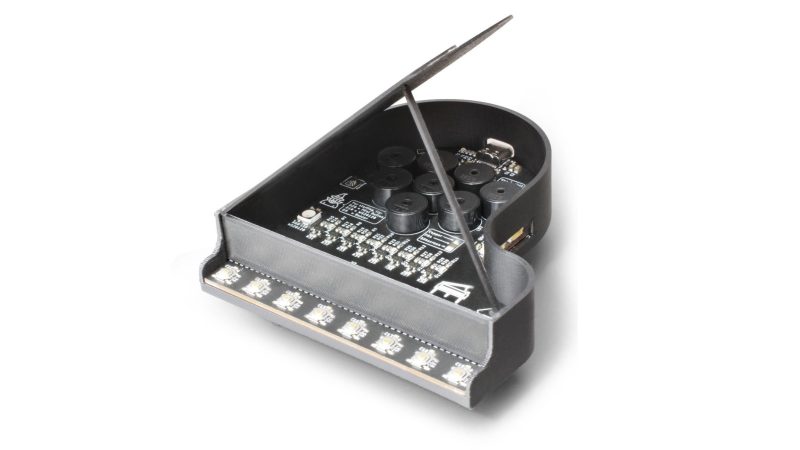Grand pianos are beautiful instruments, but take up altogether too much space. Upright pianos are smaller, but still fairly hefty. When it comes to the PiezoPiano, though, we suspect nobody could complain about its diminutive size. It’s a tiny thing with just one buzzy little octave for your playing pleasure.
The PiezoPiano is a single PCB device with a ATmega4809 running the show. It has eight buttons and eight piezo transducers that give you just one octave’s range on the keyboard. Truth be told, that’s only in one scale; you’re not getting the whole twelve tones of flats and sharps included. And, when we say keyboard, we really mean “tactile buttons.” You get the drift. It’s all assembled in a cute enclosure mimicking the shape of a real grand piano.
Fundamentally, it’s a cute little musical desktoy that reminds us greatly of the Stylophone. Impressively, though, those eight buzzers mean it has eight-note polyphony. That’s nothing to sniff at compared to all the monophonic synths out there. It’s also available on Tindie if you’d like to buy a kit off the shelf. Video after the break.
















I guess that if pianos were to replace their strings with electronics then they could take up much less space.
If only a company like Roland, Yamaha, Korg, Casio, Kawai etc. Etc. might do some research and see if it’s a viable idea…
It’s a brilliant idea and, you know, it might just work ………
Or ask Kurzweil to determine if the 12 note chromatic scale or A:440 is really the optimum once the human brain and interconnected computing occurs after the (his) singularity.
Both of these were arrived at empirically. Maybe there’s a new dimension of music that’s much more pleasing. 😎
Put resonating tubes on the piezo cluster but in a row and have a mini pipe organ. Resonating at the fundamental pitch will mellow the cicada like buzzing harmonics.
> those eight buzzers mean it has eight-note polyphony.
One of the very first things I did when learning MCUs was to program a piano. It made eight different square waves out of eight digital pins, and pressing the keys would connect each output to a single piezo buzzer through a separate resistor. Eight note polyphony.
That’s how they used to do it. You’d have a top octave generator and the rest of the circuit would just divide by two for each octave down.
Does that affect the way each note is voiced? Clearly with 8 separate speakers each note will sound the same regardless, but if you’re playing them all through 1 speaker does it affect the intonation or volume if you’re playing multiple notes?
Since it’s only employing one tonal key, it could use just intonation instead of equal temperment!
There’s that.
I’ve seen a grand piano and a baby grand piano but this is the first time I’ve seen a fetus grand piano, nice.
https://www.youtube.com/watch?v=Cf4K9cE_Xk8 – bit different, and not 100% homebrew, but still awesome, and when it controls his pipe organ (via midi) thats cool.
Doesn’t an octave usually have 12 notes?